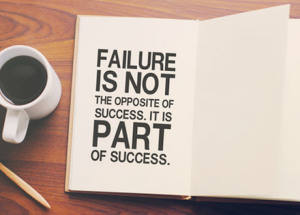The post Failure is not as painful as you expect, according to Scientists appeared first on Conor Foley.
]]>However, there is good news for anyone trying to decide whether they should take the plunge or not. According to Jessica Stillman in this article on Inc.com, new research shows that people handle failure and embarrassment far better than they think they would.
Imagined failure is way worse than the real-life kind.
To come to this conclusion, a team of Dutch researchers told study subjects they were going to complete a series of tests in pairs, informing them that if they scored above a certain level, each pair would earn rewards. Half of the participants then predicted how bad they’d feel if they failed. The other half actually took the tests and, whatever their actual performance, were told that they were personally responsible for their team’s failure to earn the reward. How bad did they really feel, the researchers then asked them.
How good were the participants at guessing how bad failure would make them feel? In short, pretty terrible. Imagined failure apparently feels way worse than real-life failure.
“Forecasters overestimated how much guilt and shame they thought they would experience (as compared with the actual emotions reported by the experiencers)–this is a classic example of the intensity bias,” according to the British Psychological Society (BPS). What’s the intensity bias? “A recurring finding in psychology is that people tend to overestimate the strength of their future emotions,” explains BPS.
Failure might hurt a lot less than you think it will, but it still hurts!
Conor Foley
The post Failure is not as painful as you expect, according to Scientists appeared first on Conor Foley.
]]>The post What Personality Trait is Shared by Creative Geniuses? appeared first on Conor Foley.
]]>Creative Researchers carried out a practical experiment in the US in the 1960’s in which they put a group of highly creative people, including author Truman Capote, in a house for a period of time and observed their behaviour.
The results of the research highlighted one particular trait of creative geniuses and it isn’t your typical ‘high IQ’ result.
“The common traits that people across all creative fields seemed to have in common were an openness to one’s inner life; a preference for complexity and ambiguity; an unusually high tolerance for disorder and disarray; the ability to extract order from chaos; independence; unconventionality; and a willingness to take risks,” write Gregoire and Kaufman, authors of a new book entitled ‘Wired to Create: Unravelling the Mysteries of the Creative Mind’.
Put simply, what differentiates the Creative Geniuses from the rest of us is openness to complexity. Creative-minded people openly and boldly confront themselves and the world around them, and they appear to find an unusual synthesis between healthy and ‘pathological’ behaviours.
As Jessica Stillman highlights in this Inc.com article on the subject: Nothing is stopping you from nudging yourself in the direction of greater openness if you’re looking to boost your creativity. Why not try following the simple but powerful advice of WayUp CEO Liz Wessel and just “say yes” more to get started? All you need to do is, whenever someone proposes as activity or idea, simply default to saying yes unless you can think of a damn good reason not to.
Drink anyone?
Conor Foley
The post What Personality Trait is Shared by Creative Geniuses? appeared first on Conor Foley.
]]>
